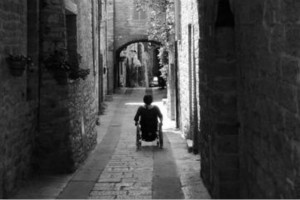
 This October, Habitat III – the United Nations Conference on Housing and Sustainable Urban Development – will take place in Ecuador to design and launch a transformative and inclusive “New Urban Agenda” for the world cities in the next two decades. Habitat III provides an important opportunity for the world’s urban policy makers and practitioners, as well as those working in the field of disability to review current practice, and consider opportunities for change.
This October, Habitat III – the United Nations Conference on Housing and Sustainable Urban Development – will take place in Ecuador to design and launch a transformative and inclusive “New Urban Agenda” for the world cities in the next two decades. Habitat III provides an important opportunity for the world’s urban policy makers and practitioners, as well as those working in the field of disability to review current practice, and consider opportunities for change.
On 6 May, Habitat III Zero Draft of the New Urban Agenda was released prior to the forthcoming negotiations of the outcome document of Habitat III. The draft which consists of two major parts, including (1) Quito Declaration on Cities for All and (2) Quito Implementation Plan for the New Urban Agenda will be negotiated by Member States in three rounds of “informal intergovernmental meetings” in New York (18-20 May, 8-10 June and 29 June- 1 July), before being presented at the 3rd session of the Preparatory Committee for Habitat III (25-27 July, Surabaya, Indonesia) and finally at Habitat III in Quito that opens on 17 October. The New Urban Agenda is expected to guide the sustainable and inclusive development of the world's cities for the 20 years. So far, persons with disabilities is not counted as one of the nine "major groups" of stakeholders in Habitat III processes.
Opportunities exists for actions to be taken by Governments, UN entities and civil society organizations at national, regional and international levels to actively participate in and make contributions in the consultations and meetings in New York, Surabaya and Quito. In addition to the above mentioned intergovernmental meetings towards the Habitat III, key milestones include two-day informal hearings with local authorities association on 16-17 May and two-day informal hearings with stakeholders on 6-7 June, both of which will be held in New York. For stakeholders who are not based in New York, the UN Habitat III opened the online Urban Dialogue to solicit public views and inputs in parallel with the informal inter-governmental meetings and stakeholder hearings taking place in New York. The first phase of the online Urban Dialogue began on 9 May and will close on 23 May. Interested individuals and organisations, especially disability-representative organizations, experts and practitioners in urban development, policy-makers and other stakeholders from around the world are invited to take advantage of the opportunity to share inputs on the zero draft of the New Urban Agenda by posting their inputs online.
Broad-based partnerships among stakeholders with active participation of persons with disabilities and their representative organizations would enrich the ongoing discourses by bringing their voices, needs and contributions as agents of change.
As the focal point disability within the UN system, the Secretariat for the Convention on the Rights of Persons with Disabilities (SCRPD) at DSPD/DESA is ready to continue its work to to better inform and support to delegations and other stakeholders in the forthcoming meetings in New York, Surabaya and Quito, and to make contributions to promote accessible and disability-inclusive development in the contexts of the Habitat III, the outcome New Urban Agenda, as well as its implementation. In this regard, SCRPD suggests the setting up of an Informal Network on Accessible and Disability-Inclusive Urban Development. SCRPD is also convening several related events, including two DESA DSPD Forums on Accessible and Disability-Inclusive Urban Development that will take place on 14 June 2016 in New York and 16 October 2016 in Quito.
 Welcome to the United Nations
Welcome to the United Nations


